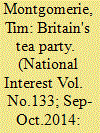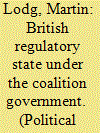| Srl | Item |
| 1 |
ID:
133633


|
|
|
|
|
| Publication |
2014.
|
| Summary/Abstract |
United Kingdom independence party and its leader, Nigel Farage, pose a dire threat to the British political establishment.
NIGEL PAUL FARAGE was a member of the Conservative Party when Margaret Thatcher was its leader. Today, he still looks and sounds a lot like an old-fashioned British Conservative. He wears pin-striped suits during the working week and bright red or yellow trousers on weekends-as many upper-class fashion criminals inexplicably do. He was educated at Dulwich College, a fee-paying private school where he enjoyed cricket and rugby and joined the army cadets.
|
|
|
|
|
|
|
|
|
|
|
|
|
|
|
|
| 2 |
ID:
133233


|
|
|
|
|
| Publication |
2014.
|
| Summary/Abstract |
What have been the effects of coalition government on the British regulatory state? This article argues that the politics of regulation have been largely about a continuation of existing patterns, namely volatile stability rather than more far-reaching change. The British regulatory state continues to be defined by boundary conflicts between the world of 'politics' and 'regulation', by conflicting calls for centralisation and decentralised autonomy, and by tensions between the wish to 'reduce' regulation and the realisation of inherent complexities.
|
|
|
|
|
|
|
|
|
|
|
|
|
|
|
|
| 3 |
ID:
133235


|
|
|
|
|
| Publication |
2014.
|
| Summary/Abstract |
'Mindless' empiricism rules in British central government, bolstered by the use of prerogative powers and the absence of any 'court of appeal' to insist on definitions and uniformities. This gives arguments about quangos-arm's-length bodies-a surreal quality. The Cameron coalition has created many new quangos, while claiming a cull. Unless and until Whitehall acquires, or is forced to acquire, better habits of mind, it may be a waste of time for academics and reformers to prepare taxonomies and call for more administrative rationality.
|
|
|
|
|
|
|
|
|
|
|
|
|
|
|
|
| 4 |
ID:
133585


|
|
|
|
|
| Publication |
2014.
|
| Summary/Abstract |
What role do third parties play in the Arab-Israeli conflict, and to what extent do domestic political constraints shape this role? Answering these questions has important ramifications for understanding the interplay between domestic and international politics. One useful tool to conduct this research is the two-stage decision-making framework, Poliheuristic (Ph) Decision Theory, which eliminates options from the choice set that do not meet domestic political requirements. This paper applies Ph theory to a case study from the conflict's infancy, the British decision in 1922 to affirm the policy of a Jewish national home (based on the Balfour Declaration 1917) despite violent Arab opposition. It argues that the decision was based solely on domestic political needs and did not attempt to address tensions in Palestine. It concludes that Ph theory provides a highly effective theory of decision-making for assessing motivations and policy decisions of third parties in the Arab-Israeli conflict.
|
|
|
|
|
|
|
|
|
|
|
|
|
|
|
|
| 5 |
ID:
133384


|
|
|
|
|
| Publication |
2014.
|
| Summary/Abstract |
In 1998, the British government led by Prime Minister Tony Blair released the Strategic Defence Review (SDR), in which it identified a requirement for twelve state-of-the-art warships for the Royal Navy (RN) to be configured for antiair warfare.1 This new naval platform was conceived as a replacement for the Type 42 destroyers, which had first entered service in 1978; its development was initially associated with the Anglo-French-Italian Horizon project that had replaced the NATO Frigate Replacement, from which Britain withdrew in 1989. That vision, however, had a very short shelf life. Some months after the SDR's release, Britain withdrew from the Horizon project and launched an indigenous Type 45 destroyer program.
|
|
|
|
|
|
|
|
|
|
|
|
|
|
|
|